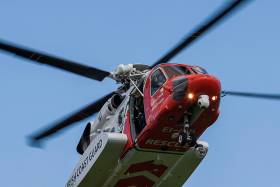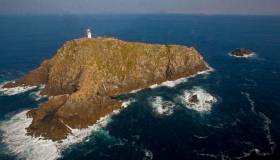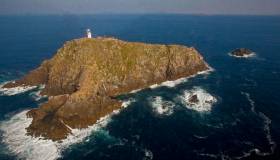Displaying items by tag: Black Rock
#Rescue116 - Favourable conditions this weekend will aid a fresh search of the waters around Black Rock for the two Irish Coast Guard personnel still missing after the Rescue 116 tragedy four months ago.
Winch operator Paul Ormsby and winchman Ciarán Smith have been lost at sea since the incident off Mayo’s Mullet Peninsula on 14 March that also claimed the lives of Captains Dara Fitzpatrick and Mark Duffy.
The forecast for this weekend is expected to allow for new searches of Black Rock by the Garda Water Unit’s diving team, according to TheJournal.ie.
It’s also hoped that the search might turn up additional evidence to help with the investigation into the helicopter crash, such as one of the aircraft’s engines believed to be on the sea bed.
Earlier this week, RTÉ’s Prime Time reported that the coastguard’s helicopter operators were made aware four years ago of the absence of data on Black Rock from the fleet’s mapping computers.
It also emerged this week that the Irish Coast Guard is yet to acquire a permanent replacement for the crashed Sikorsky S-92 that flew under the Rescue 116 code, as The Times reports.
#Rescue116 - A new report reveals that the absence of data on Black Rock from Rescue 116’s onboard warning system was flagged with the Irish Coast Guard’s helicopter operators years before the fatal crash earlier this year.
Captains Dara Fitzpatrick and Mark Duffy, along with winch operator Ciarán Smith and Paul Ormsby, died after their Sikorsky S-92 went down at the small Co Mayo island, west of Blacksod on the Mullet Peninsula, in the early hours of 14 March 2017.
Four months on and despite exhaustive searches of the area, the remains of Smith and Ormsby have not been found.
April's interim report into the tragedy suggested that the helicopter had been flying using a pre-programmed route that was missing specific data relating to Black Rock, while en route to a planned refuelling stop at Blacksod.
Now a report from RTÉ’s Prime Time says the issue of the missing data was raised four years ago with a senior manager at CHC Ireland, which won the 10-year, €500 million contract to operate Ireland’s helicopter SAR services in 2012.
The Irish fleet of long-range SAR helicopters was equipped with an Enhanced Ground Proximity Warning System, or EGPWS, in 2013.
That year, Sligo-based Irish Coast Guard pilots noted that Black Rock was missing from the EGPWS during routine test flights in the area.
However, Prime Time learned from a source that weeks after the incident, coastguard staff were told management were looking into whether that information had been passed on to those responsible for updating the system’s obstacle database.
That same database was found just days after the Black Rock accident to have incorrect information for Skellig Michael, listing it as just 56m rather than its actual 217m height, though this has since been corrected.
RTÉ News has more on the story HERE.
#Rescue116 - The Irish Lights vessel Granuaile is in Galway preparing to join the search for the missing crew of Rescue 116, according to Galway Bay FM.
The multifunctional vessel, built to operate in difficult sea conditions, is being stocked with additional equipment ahead of a major search of the crash site off Blacksod in Co Mayo scheduled for tomorrow (Sunday 19 March) with the forecast of improved weather conditions.
TheJournal.ie reports that what’s believed to be wreckage from the Sikorsky S92 helicopter has been found on the island of Black Rock, west of Blacksod, but there are no signs of a crash having occurred at that site.
The coastguard helicopter’s black box was also detected on Wednesday (15 March) near the island, but divers have been prevented from reaching its location due to the poor weather and sea state.
Three crew – chief pilot Mark Duffy and winch men Paul Ormsby and Ciarán Smith — remain missing after the incident in the early hours of Tuesday (14 March) as the Dublin-based Irish Coast Guard helicopter provided top cover for a medevac.
The funeral of Capt Dara Fitzpatrick, who was taken from the scene in the first hours of the search and rescue effort, takes place this morning (Saturday 18 March).
Meanwhile, it emerged on Thursday (16 March) that Rescue 116 was tasked to the scene on Tuesday after the Irish Air Corps was unable to provide assistance due to reduced capacity, according to The Irish Times.































































